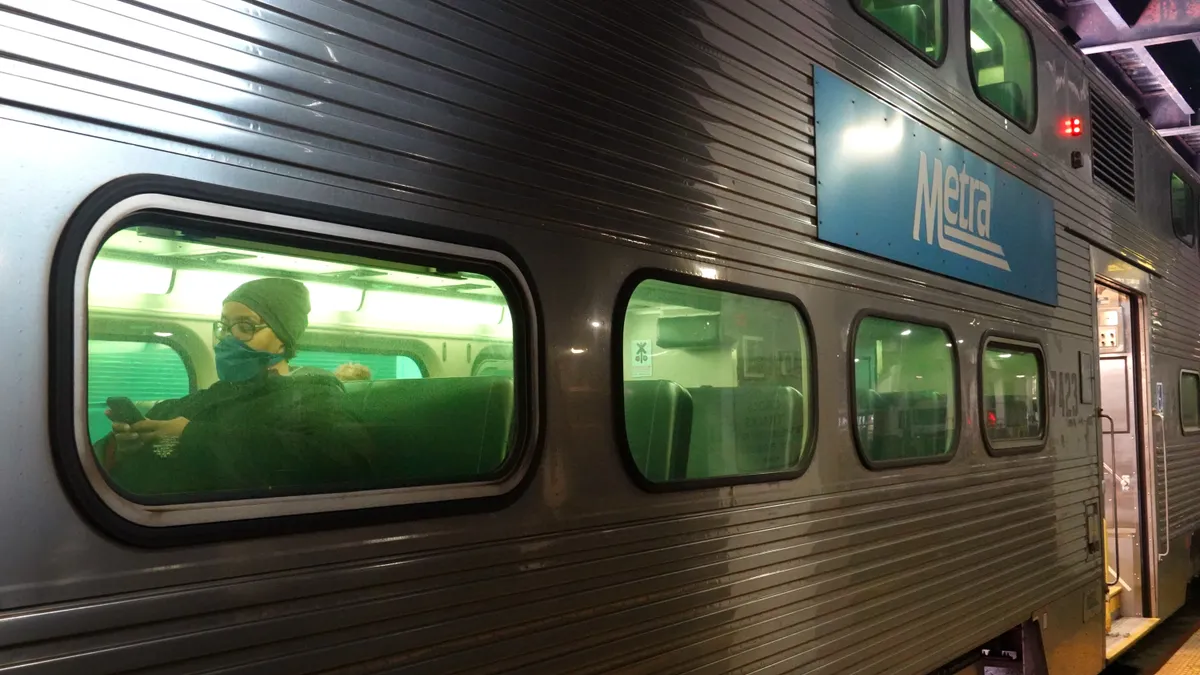Dive Brief:
- Chicago-area commuter rail Metra will convert three of its oldest diesel-powered locomotives to run on zero-emission battery-electric power, under a plan approved by its board of directors last week. It has the option to convert an additional three locomotives after testing the initial three, for a total project cost of $34.6 million. The initial conversion is expected to be finished in about 3.5 years.
- The locomotives will have a range of about 150 miles. Chargers will be installed at the main yard and a farther location.
- Metra considers this a pilot project to determine whether this system will work for its operating environment and which technologies are best. It plans to test the converted units on a roughly 15-mile section of a commuter line that runs from downtown Chicago to Joliet, Illinois.
Dive Insight:
Battery-operated locomotives are emerging in the market, but so far mostly in freight transport rather than transit. Wabtec unveiled its first battery-electric locomotive last fall, and two months later Canadian National Railway purchased one. This year, Union Pacific Railroad announced plans to purchase up to 20 battery-electric locomotives from Wabtec and Progress Rail and upgrade its yard infrastructure.
New York commuter rail Long Island Rail Road planned to add battery-electric trains, but last month scrapped the project after determining that retrofitting its current equipment isn’t feasible. Massachusetts Gov. Charlie Baker signed legislation earlier this month that includes orders for Boston-area transit agency Massachusetts Bay Transportation Authority to pursue battery-electric locomotives. Earlier this summer, however, at least one MBTA board member expressed skepticism that the agency would be the first in the nation to roll out the technology since other transit agencies were also pursuing it.
Because battery-electric trains are a new concept for transit, Metra didn’t model its project on one in another city, according to Metra spokesperson Meg Thomas-Reile. Instead, the agency issued a request for proposals last year to determine if and how equipment manufacturers could do such a retrofit and awarded the work to Progress Rail.
“This is a test to see if this technology can perform the way we need it to in commuter operations... and that includes everything from serving customers to charging to see how this is going to work," Thomas-Reile said.
The converted locomotives will be compatible with existing railcars and diesel locomotives, operate at speeds up to 79 miles per hour and the batteries will also power on-board systems like lighting and HVAC. They are expected to be quieter and cheaper to operate and maintain than diesel versions.
In 2010, a Chicago Tribune investigation raised questions about air quality on Metra trains due to high levels of diesel soot. Metra then launched a series of air quality tests, in addition to soliciting task force recommendations for reducing diesel exhaust. Federal funding has helped the agency advance its decarbonization goals.
Besides purchasing the battery-electric locomotives, Metra has taken other steps recently to reduce emissions. It ordered 15 remanufactured locomotives, with the option to purchase 27 more, that meet modern U.S. Environmental Protection Agency standards and will replace legacy locomotives. It seeks to purchase six higher-standard switch locomotives — typically used for moving railroad cars inside a rail yard — and one all-electric switch locomotive.
“Our goal is to get as green as possible,” Thomas-Reile said. “With electric-motor vehicles on the market now, and the market growing, we want to be forward-thinking and look at potential applications.”
Not all emerging electrification technologies are feasible for Metra, she explained. The commuter rail shares much infrastructure with freight rail, so it couldn’t use a catenary system in which vehicles connect to an overhead power line, as is popular for buses in cities like San Francisco and Seattle.
Charging infrastructure is an integral part of Metra’s project. The chargers will be part of a separate procurement, and Metra will issue a separate request for bids once the locomotive design is finalized, according to Thomas-Reile.
Considering Chicago’s reputation for harsh winters, part of Metra’s testing involves monitoring and analyzing the retrofitted locomotives’ performance in winter weather. Electric vehicles experience performance declines in cold weather because extreme cold affects lithium-ion batteries.
“Everything's great on paper, but we have to see how it works in a real-world environment," Thomas-Reile said.












